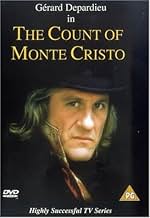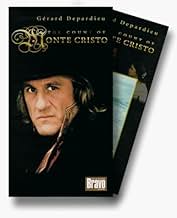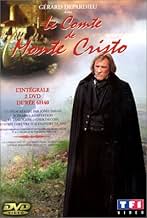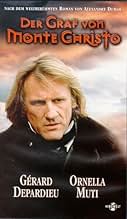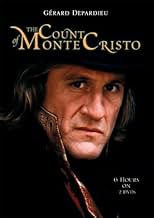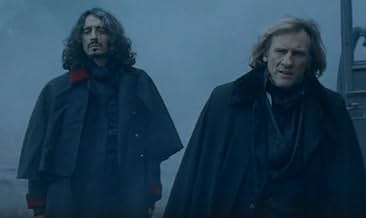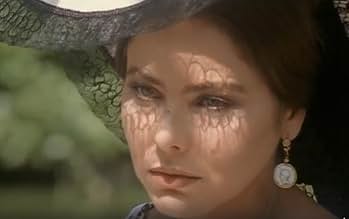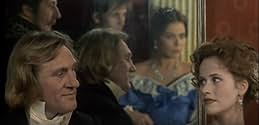Le Comte de Monte Cristo
- Mini-série télévisée
- 1998
- 1h 40min
NOTE IMDb
7,8/10
7,4 k
MA NOTE
Edmond Dantès est injustement envoyé en prison pour 18 ans. Il s'évade pour récupérer sa fiancée Mercedes et se venger de son ennemi juré, Mondego.Edmond Dantès est injustement envoyé en prison pour 18 ans. Il s'évade pour récupérer sa fiancée Mercedes et se venger de son ennemi juré, Mondego.Edmond Dantès est injustement envoyé en prison pour 18 ans. Il s'évade pour récupérer sa fiancée Mercedes et se venger de son ennemi juré, Mondego.
- Récompenses
- 3 victoires au total
Parcourir les épisodes
Avis à la une
Eight hours allows for a greater presentation of the many subplots and complexities of the storyline. Depardieu (once you get past his size) is excellent as the Count, a man who, as the reviewer from Amazon says, exchanges one prison for another, a prison of his own hatred. The cast is general is very good and convincing, with Ornella Muti certainly the definitive Mercedes. Set design and production values are excellent.
I have only two criticisms. The first and more minor one is that even this long adaptation doesn't have everything. They couldn't, of course, portray everything -- the book itself is well over 1,000 pages and in truth has padded sections -- but some worthwhile aspects of the story were cut, most notably early sequences with the Abbe Faria (who teaches Dante how to read and write) a very famous part that's usually included in dramatizations of the story. The ending, too, is happier than Dumas's. (I should add that some sequences were very sensibly cut).
A more serious criticism is that Dantes's character is too soft. Depardieu is a fine actor but his portrayal allows Dantes to come off far more sympathetic than I think Dumas intended. The coldness and bloodthirstiness of the Count is not emphasized as much as it might (one sequence at an execution has a very different spin from the way it's presented in the book, for example), nor is the extent of his hatred. This is a real flaw, partly because it makes light of the theme of the story, the effect of revenge on the revenger, and partly because the climax is not as effective if we're already on Dantes side. The flaw here is not with Depardieu, who does his job admirably, but rather with the screenwriter and director.
As such, I can't call this the definitive version -- a little more courage on the screenwriter and director's part would've done wonders. Still, it's probably the best we're going to get. It's hard to imagine anybody else lavishing this kind of care and attention on the story.
I have only two criticisms. The first and more minor one is that even this long adaptation doesn't have everything. They couldn't, of course, portray everything -- the book itself is well over 1,000 pages and in truth has padded sections -- but some worthwhile aspects of the story were cut, most notably early sequences with the Abbe Faria (who teaches Dante how to read and write) a very famous part that's usually included in dramatizations of the story. The ending, too, is happier than Dumas's. (I should add that some sequences were very sensibly cut).
A more serious criticism is that Dantes's character is too soft. Depardieu is a fine actor but his portrayal allows Dantes to come off far more sympathetic than I think Dumas intended. The coldness and bloodthirstiness of the Count is not emphasized as much as it might (one sequence at an execution has a very different spin from the way it's presented in the book, for example), nor is the extent of his hatred. This is a real flaw, partly because it makes light of the theme of the story, the effect of revenge on the revenger, and partly because the climax is not as effective if we're already on Dantes side. The flaw here is not with Depardieu, who does his job admirably, but rather with the screenwriter and director.
As such, I can't call this the definitive version -- a little more courage on the screenwriter and director's part would've done wonders. Still, it's probably the best we're going to get. It's hard to imagine anybody else lavishing this kind of care and attention on the story.
I first saw this film on (analog!) satellite TV some 10 to 12 years ago. I distinctly recall at least one scene from that time that is missing in the commercial releases.
The one of which I am certain was a courtroom scene where Villefort confronts his son who publicly identifies himself as such. This seems to have been replaced by a brief scene in which Dantes tells V. about the son being in prison at the same time he reveals his true identity.
I also recollect a more lengthy scene with the young Dantes in Marseilles and another one containing conversations between Dantes and Faria in Château D'If, although I may be confusing these with other productions of this novel.
Has anyone else noticed this? I would very much like to have a copy of the complete production, if one is actually available.
The one of which I am certain was a courtroom scene where Villefort confronts his son who publicly identifies himself as such. This seems to have been replaced by a brief scene in which Dantes tells V. about the son being in prison at the same time he reveals his true identity.
I also recollect a more lengthy scene with the young Dantes in Marseilles and another one containing conversations between Dantes and Faria in Château D'If, although I may be confusing these with other productions of this novel.
Has anyone else noticed this? I would very much like to have a copy of the complete production, if one is actually available.
Alexander Dumas's immortal novel has been treated to many film and television adaptations, but until you watch the 1998 miniseries, you've never really seen it. If you've read the novel-I have an English-translated copy on my shelf-you know that it's impossible to condense every plot point into a two-hour movie, which is why the other adaptations have stuck to the main storyline and cut out the intricate plans of the title character. In this six-hour miniseries, it's almost like reading the book! And, since this is a French version, who else but the incomparable Gérard Depardieu could tackle the leading role?
From the opening scene, with Gérard's son Guillaume portraying him as a young man, you'll be purely captivated. To be brief, Guillaume is innocently involved in a treasonous plot, and before he can marry his sweetheart, Naike Rivelli, he's arrested, tried, and locked away in an Alcatraz-type prison on an island. Imprisoned for eighteen years, Guillaume becomes Gérard, and Gérard vows to escape and exact his revenge on those who did him wrong. Many people have cited the escape scene as their favorite, and it is incredibly exciting in this version. And, since this is a six-hour miniseries, Gérard's friendship with his fellow inmate, Georges Moustaki, isn't rushed like it sometimes is in other movies. Nothing is rushed in this adaptation, allowing the audience to understand every detail and complex plot point, and enjoy the execution of each scene.
How is it possible for Gérard Depardieu to be so wonderful? This role calls for so much, and some who've taken it on have been more successful than others. There's physical acting in addition to the highly dramatic scenes, a need to fit in to the time period, and the ability to take on many different disguises without being comical. Revenge, remorse, sympathy, determination, relief, and intelligence are just a few of the qualities the actor needs to embody. If he doesn't, he'll never convince the audience to root for him as he systematically ruins the lives of others. Gérard puts more of himself into this role than in any of the other thirty films I've seen. It's truly an experience to watch him in this miniseries. It feels that he, and not Alexandre Dumas, wrote the story, and that he, and not Josée Dayan, who directed the camera and his fellow actors to completely revolve around him. He is Edmond Dantès. His expressions are mesmerizing, and at times heartbreaking. He delivers his lines with such passion, understanding, and sensitivity, it's as if he's signed "Finis" in ink so that no other actor will bother to take on another remake.
Jean Rochefort and Pierre Arditi make the most of their deliciously villainous roles, and Ornella Muti plays the older version of Naike's role, Edmond Dantès's sweetheart. In a truly family affair, Gérard's daughter, Julie plays Ornella's daughter, and it's very cute to see their scenes together. You can practically feel his pride that both his children are acting alongside him in this masterpiece. Even if you're partial to the 1975 version, I recommend you watch this one. It's so much more thorough, it'll feel like a different story, so you won't be betraying Richard Chamberlain by liking both versions.
From the opening scene, with Gérard's son Guillaume portraying him as a young man, you'll be purely captivated. To be brief, Guillaume is innocently involved in a treasonous plot, and before he can marry his sweetheart, Naike Rivelli, he's arrested, tried, and locked away in an Alcatraz-type prison on an island. Imprisoned for eighteen years, Guillaume becomes Gérard, and Gérard vows to escape and exact his revenge on those who did him wrong. Many people have cited the escape scene as their favorite, and it is incredibly exciting in this version. And, since this is a six-hour miniseries, Gérard's friendship with his fellow inmate, Georges Moustaki, isn't rushed like it sometimes is in other movies. Nothing is rushed in this adaptation, allowing the audience to understand every detail and complex plot point, and enjoy the execution of each scene.
How is it possible for Gérard Depardieu to be so wonderful? This role calls for so much, and some who've taken it on have been more successful than others. There's physical acting in addition to the highly dramatic scenes, a need to fit in to the time period, and the ability to take on many different disguises without being comical. Revenge, remorse, sympathy, determination, relief, and intelligence are just a few of the qualities the actor needs to embody. If he doesn't, he'll never convince the audience to root for him as he systematically ruins the lives of others. Gérard puts more of himself into this role than in any of the other thirty films I've seen. It's truly an experience to watch him in this miniseries. It feels that he, and not Alexandre Dumas, wrote the story, and that he, and not Josée Dayan, who directed the camera and his fellow actors to completely revolve around him. He is Edmond Dantès. His expressions are mesmerizing, and at times heartbreaking. He delivers his lines with such passion, understanding, and sensitivity, it's as if he's signed "Finis" in ink so that no other actor will bother to take on another remake.
Jean Rochefort and Pierre Arditi make the most of their deliciously villainous roles, and Ornella Muti plays the older version of Naike's role, Edmond Dantès's sweetheart. In a truly family affair, Gérard's daughter, Julie plays Ornella's daughter, and it's very cute to see their scenes together. You can practically feel his pride that both his children are acting alongside him in this masterpiece. Even if you're partial to the 1975 version, I recommend you watch this one. It's so much more thorough, it'll feel like a different story, so you won't be betraying Richard Chamberlain by liking both versions.
Gérard Depardieu has lavished much care and attention to detail on this production of the famous Dumas story. He is most impressive as Edmund Dantes who is falsely imprisoned by his "friends" in the awful Château d'If for some 18 years, then escapes, finds a vast fortune, and as the mysterious Count takes revenge upon those who betrayed him in a very complex series of intrigues. Bearing in mind the great length of the original novel, simplification of the sub plots are inevitable in any screen version, although the extended running time of this TV series allows much of the text to be brought to the screen faithfully. Using some quite stunning set pieces and beautiful scenes to background the action, the cast perform exceedingly well, dominated by Depardieu's portrayal of Monti Cristo. Although a rather overweight Count, his strength as an actor overcomes this minor flaw, and certainly its unlikely we'll see a better performance of the role for years to come. If you have the patience to view the extended version here, it is a rewarding and finally well crafted adaption of a most difficult subject.
I'm a big fan of the Alexandre Dumas story' Count of Monte Christo. The atmosphere in as well the book as the 2002 movie directed by Kevin Reynolds is fabulous!! Although in the 2002 movie I would have liked to see more detailed revenge plans, I really liked the part in which Edmond Dantes is educated by his visitor in jail Abbe Faria... In this miniseries the opposite is true.. it's absolutely fabulous in working out the part of revenge (so especially after you've watched the first 1/2 episodes, it gets great). Dantes teached by Faria is less more interesting in this miniseries.. which I think is logical since the French have a totally opposite view on what's interesting in comparison to the Americans. Gerard Depardieu acts great as le Comte le Monte Christo.. and this miniseries sticks better to the original story which I also like... One 2 Watch.. more than 1 time.. :-)
Le saviez-vous
- AnecdotesGérard Depardieu also plays Edmond's father during the flashback scenes, where the young Edmond is played by his own son, Guillaume Depardieu.
- ConnexionsFeatured in Voyance et manigance (2001)
Meilleurs choix
Connectez-vous pour évaluer et suivre la liste de favoris afin de recevoir des recommandations personnalisées
- How many seasons does The Count of Monte Cristo have?Alimenté par Alexa
Détails
- Date de sortie
- Pays d’origine
- Site officiel
- Langue
- Aussi connu sous le nom de
- The Count of Monte Cristo
- Lieux de tournage
- Sociétés de production
- Voir plus de crédits d'entreprise sur IMDbPro
Contribuer à cette page
Suggérer une modification ou ajouter du contenu manquant


